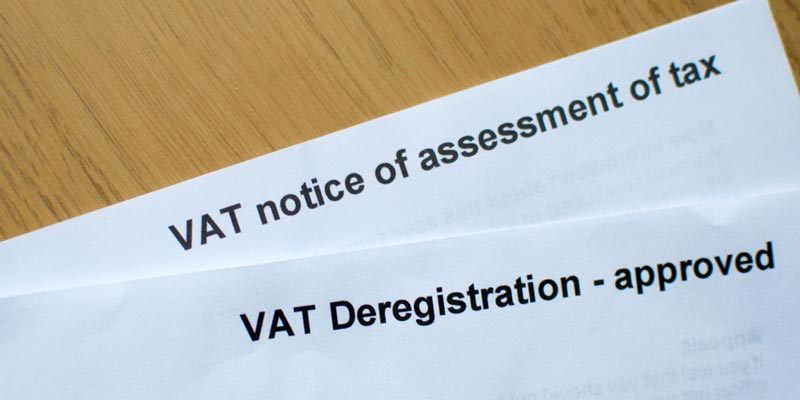Article updated April 2024
Question submission date: May 2022
Full Question: “I’ve had a Limited Company for one year and voluntarily registered for VAT, but find I am not reaching the VAT threshold, can I de-register?”
Yes, you can de-register for VAT at any time without penalty providing your business falls below, or you expect it to fall below the de-
registration threshold of £90,000 (rate applicable from April ’24). You shouldn’t assume that being VAT registered is in the best interests of the business, so, if you don’t need to be, de-registering could be a good option.
Before you go ahead with the de-registration process (explained in full later in this article), there are some questions that you should ask yourself to make absolutely certain that you’re doing the right thing and won’t want to change your mind in the near
future. And of course, we’d advise you to talk to your accountant for expert advice.
Ask yourself these questions:
-
Are my circumstances likely to change?
If you know that you have new contracts coming up or that there will be a significant increase in your turnover you may think about remaining VAT registered. In other words, if you anticipate that your total VAT taxable turnover in a 12-month period will exceed £90,000 you’ll have to be registered so it may be easier to stay registered now.
-
Will de-registering have an impact on my potential business contacts?
Well… it may. Simply because some companies prefer to only deal with VAT-registered businesses as there can be an associated perception of size and reputation and, while unusual, there could be some that won’t want to deal with you if you’re not.
-
Even though I don’t need to be, are there any benefits to me remaining VAT registered?
That somewhat depends on the business you are in. As stated above, being VAT registered can give other businesses confidence to deal with you as (rightly or wrongly) they will see you as established and reputable.
In addition, of course, once you are de-registered you won’t be able to reclaim the VAT on purchases that you make. However, bear in mind that it also means you won’t be adding VAT to your prices which could well make you more appealing than the competition.
Another benefit (although it may not always feel like it!) is that being forced to maintain records diligently every three months means that you will always be on top of your finances which is an important part of running your own business. Knowledge is power after all!
How to go about de-registering for VAT?
So, you’ve decided you want to go ahead with de-registering (of course we’d advise that you talk to your accountant before getting the ball rolling, just to make sure you’re not missing anything). And now what? What is the process that you need to go through to legally de-register?
It’s actually remarkably simple. You can cancel your registration online by filling in HMRC’s VAT7 Form (either yourself or you can ask your accountant to do this). You’ll find the form here.
On average it will take three weeks for your cancellation to be confirmed by HMRC and for them to give you your official cancellation date – which, when voluntary, is the date you asked to cancel. If you applied online, they would send confirmation to your VAT online account, otherwise it will arrive through the post. That date of cancellation is important as from that date you MUST stop charging VAT. Another thing to note is that you will still need to keep your VAT records (to date) for six years.
If you try and deregister, but HMRC realise that you should not have done, they will automatically re-register you and any VAT that you should have paid in that period will need to be accounted for.
Just because you’ve de-registered . . . it doesn’t mean there isn’t a final bit of paperwork to do.
There will be one more VAT return to do which will be for the period up to (and including) your cancellation date. It’s important that you don’t wait until you’ve received all your invoices before doing this. In this return you’ll need to account for any assets and stock you have if you could reclaim VAT at the time you bought them, and if the total VAT due on them is over £1,000. For anything bought after this date you’ll still be able to reclaim VAT for the period while you were registered.
Just to be clear, this article is written in answer to the question about voluntarily de-registering for VAT, cancelling registration because you have to or do so incorrectly is a different issue.
Still unsure? Talk to us directly here at Integro and we’ll advise you as to the best thing to do for you and your business.


